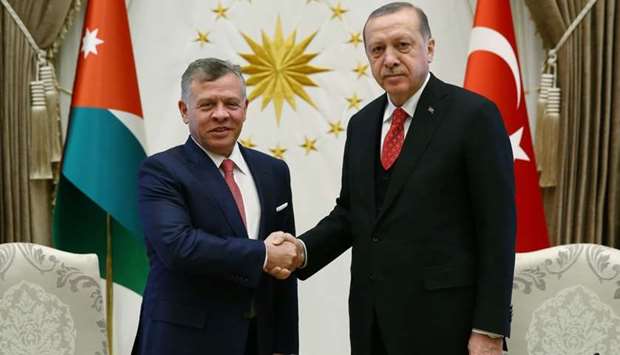Turkish President Recep Tayyip Erdogan on Wednesday strongly warned the United States against recognising Jerusalem as the capital of Israel, saying the move would help terror groups.
"Such a step will only play into the hands of terror groups," Erdogan said at a joint news conference in Ankara after talks with Jordan's King Abdullah II.
"This mistaken step... will lead to public outrage in the entire Islamic world, dynamite the ground for peace and ignite new tensions and clashes in our region," he said.
US President Donald Trump was set to announce Wednesday that Washington would recognise Jerusalem as Israel's capital and that it would move the US embassy from Tel Aviv, a plan that has caused consternation in the Islamic world and beyond.
The Turkish presidency said earlier that Erdogan was calling a summit of the Organisation of Islamic Cooperation (OIC), the main pan-Islamic body, in Istanbul on December 13 to discuss the move.
King Abdullah, who had been personally informed by Trump of the move by telephone, backed Erdogan's warnings and said East Jerusalem must be the capital of a future Palestinian state.
"There is no alternative to a two-state solution," Abdullah said, speaking in English.
He cautioned that "Jerusalem is key to any peace agreement (between Israel and the Palestinians) and is key to the stability of the entire region".
Abdullah said he had told Trump of "our concerns" over the decision to move the US embassy to Jerusalem during their telephone call.
He added that it was "imperative now to work fast" to reach a final status solution and a peace agreement between Palestinians and Israelis.
"This must allow the Palestinians to establish an independent state side by side with Israel and its capital in East Jerusalem."
He also warned that ignoring Muslim rights in Jerusalem "will only fuel further extremism and undermine the war against terrorism."
Last year, Turkey and Israel ended a rift triggered by Israel's deadly storming in 2010 of a Gaza-bound ship that left 10 Turkish activists dead and led to a downgrading of diplomatic ties.
The two sides have since stepped up cooperation, in particular in energy, but Erdogan, who regards himself as a champion of the Palestinian cause, is still often bitterly critical of Israeli policy.
The United States supports a strong relationship between Turkey, the key Muslim member of NATO, and Israel, which is Washington's main ally in the Middle East.

Turkish President Recep Tayyip Erdogan (R) shaking hands with King Abdullah II of Jordan during a meeting at the presidential palace in Ankara.
